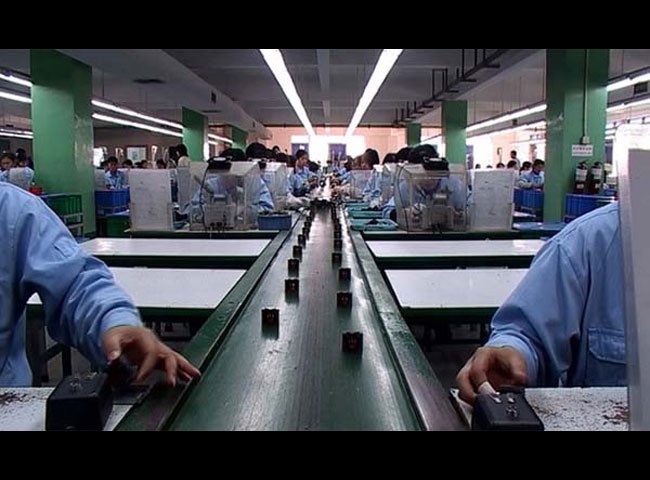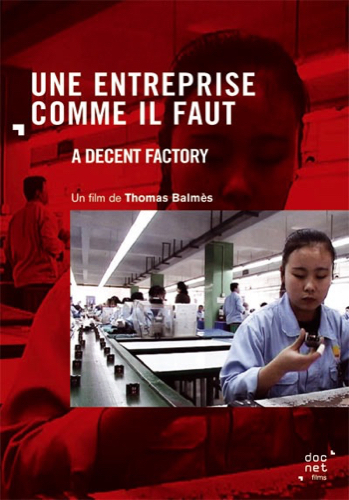Une entreprise comme il faut
-
Réalisé par Thomas Balmès • Écrit par Thomas Balmès
-
Finlande, France • 2004 • 79 minutes
- Réalisation :
Thomas Balmès - Écriture :
Thomas Balmès - Image :
Thomas Balmès - Son :
Mervi Junkkonen, Tuomas Klaavo, Pirkko Tiitinen - Montage :
Catherine Gouze
- Production (structure) :
Margot films - Coproduction :
Artline Films, Making Movies Oy - Ayant droit :
Margot films
- N° ISAN :
ISAN 0000-0002-33FD-0000-9-0000-0000-A
Résumé
La question de l’entreprise durable devient de plus en plus importante pour les firmes occidentales dont la production a lieu majoritairement dans les pays les plus pauvres de la planète. Nokia, leader mondial des téléphones portables, vient d’embaucher Hanna Kaskinen comme "spécialiste moral et environnemental" afin de promouvoir ce concept. Mais, apparemment, les managers de Nokia sont encore peu familiers de ce phénomène. Thomas Balmès a suivi Kaskinen et son conseiller anglais en Chine lors d’une visite des fournisseurs de Nokia. Malaise parmi les managers britanniques qui marchent sur la corde raide entre bénéfice et législation...
La franchise initiale des cadres change quand ils découvrent que le film n’est pas seulement destiné à une utilisation interne...
""The one and only social responsibility of business is to make profits" was a guiding principle for Milton Friedman, winner of the Nobel Prize in Economics. It is the principle that appears at the start of Thomas Balmès’ film, serving as an introduction to the Nokia managers who seem to be unanimously in agreement with it. Their company outsources its mobile phone component parts to China, where the cost of production is lower. In doing so, they create an ethical image problem that threatens to reduce the profit margin. To call a spade a spade, comments Hanna Kaskinen, the dearly paid company name shouldn’t risk being soiled by the blood of Asian child-workers.
Kaskinen, together with Louise Jamison, were commissioned by Nokia to visit a supplier’s factory in China and draw up a report of conditions there. As he follows the two around, his clear-sighted takes illustrate the methods adopted by the appointed "ethical and environmental specialists" The resulting images are many-sided and devoid of flourishes: while disclosing the factory manager’s attempts at cover-ups, they confirm the inhumane working conditions. The camera dwells on the exhausted faces of the factory women who, day in and day out, repeat the same movements along the assembly line. For this they receive wages that are far below the required minimum.
A Decent Factory ruthlessly lays bare the factory’s conditions. Moreover, the company’s ethical policy ended up somewhat alienating the filmmaker, in as much as – far from China – debate on the question by the company directors was preceded by an enjoyable escapade at a Scandinavian sea resort."
(Elias Schafroth - Visions du Réel)
Mot(s)-clé(s) thématique(s)
Sélections et distinctions
- 2005 • Doclisboa - Festival Internacional de Cinema Documental • Lisbonne (Portugal) • Sélection
- 2005 • Visions du réel • Nyon (Suisse) • Investigations
- 2005 • Hotdocs - Canadian International Documentary Festival • Toronto (Canada) • Sélection
- 2005 • Prix Europa • Berlin (Allemagne) • Prix Europa
- 2005 • IDFA - International Documentary Festival Amsterdam • Amsterdam (Pays-Bas) • Sélection
Comment avoir accès au film ?
- Édition DVD
-
Accès VOD
- Il n'existe pas d'accès en VOD à notre connaissance
- Diffusion non commerciale / Consultation


